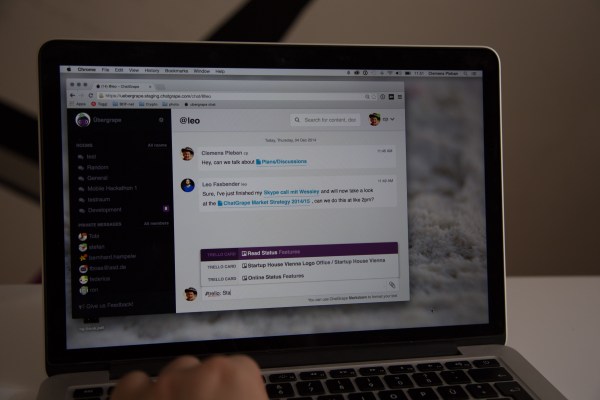The enterprise and team messaging space is as crowded and heated as ever. Stewart Butterfield’s Slack is currently the talk of Silicon Valley, after the young company raised an additional $120 million at a post-money valuation of $1.12 billion. Others that immediately spring to mind include Atlassian’s HipChat, Cotap, a messaging startup co-founded by two ex-Yammer executives, and Europe’s Fleep, founded and funded by ex-Skype employees, and IMbox.me, backed by ex-Nokia President and CEO Olli Pekka Kallasvuo, to name but a few. Therefore, you’d be forgiven for thinking there’s little room left for a new enterprise messaging entrant. Unless, of course, it brings something genuinely innovative to the table.
Enter ChatGrape, a startup based out of Austria that might otherwise be mistaken for being another Slack or HipChat clone. But, actually, under the hood there’s some interesting — and extremely useful — technology. Namely, the way the enterprise and team messaging app ties into a growing list of third-party services in a way that significantly reduces the time it takes to look up, link to and reference external information, such as a document, calendar entry, or code repository update.
“Our aim is to eliminate the ‘look-up factor’; the time you lose whenever you interrupt whatever you’re doing to look something up,” co-founder and COO Leo Fasbender explains. “This is a growing problem, because modern companies use an increasing amount of specialized tools for specialized services, like Trello for Task Management, GitHub as a Code Repository and Google Docs for online collaboration. The consequence is an increasing amount of time wasted switching between these services and looking for information and data that is scattered across different cloud services.”
This is where ChatGrape comes into its own. Unlike other chat-based team communication tools, it isn’t limited to simply pulling in information from other services — RSS-style — but is a lot more two-way, via something the startup calls Deep Service Integration.
“Here we integrate with external tools and services on a much deeper, more integrated and intuitive way than our competitors,” says Fasbender. “We’ve built a type of search engine that indexes every tool/service you connect with ChatGrape (so far, we’ve got GitHub, BitBucket, Google Drive, Google Calendar and Trello, with DropBox and Jira coming up next). Now, by typing # you trigger ChatGrape’s smart autocomplete that allows you to add, attach and reference any file or issue directly, instantly and on-the-go.”

In a demo given to me over Skype, and in my own testing, I could grok immediately how much time this feature alone could potentially save. I’ve used pretty much every team messaging app out there, either as a writer at TechCrunch or on my own startup adventures. However, ChatGrape’s look-up and third-party service indexing provides that rare example of a feature that, retrospectively, you wonder why isn’t already a standard offering.
“From the very beginning, we knew we had to take a different route if we wanted to add value to this market. We wouldn’t have bothered with this if it was just about launching another team-chat or Slack-clone or whatever. No, we knew that we had to have a meaningful innovation and improvement over the existing solutions,” says Fasbender.
“With our Deep Service Integration we’ve now succeeded in doing so: For the first time ever, you can now communicate with your team and if you want to reference or attach a document, or mention an appointment or whatnot, and do it on-the-go. As naturally as it is for all of us to tag a friend on Facebook, only that it’s no longer about the pages you’ve liked, but the files and data you work with, every single day.”
Meanwhile, the company is working with SAT (Research Studios Austria) and most recently The Austrian Research Institute for Artificial Intelligence (OFAI) to develop ChatGrape’s chat ‘intelligence’ even further. This will enable it to detect and trigger workflows automatically, based on Natural Language Processing (NLP), such as the ability to recognise dates, questions, assignments and to-dos.
So, for example, an extremely quick poll could be created by typing “@Marketing Team, should we do this new banner in green or blue?”. Or a task could be assigned by typing “@Peter, I need you to get the new homepage done by Tuesday 5pm!”, triggering the task and timestamp to be added to Wunderlist or another to-do app.
That would speed things up once again, and — presuming the system is able to filter out false positives and nail the required User Interface — make the likes of Slack et al. look long in the tooth almost over night. All of which would be quite an achievement for such a moderately funded startup hailing from Europe.
To date, ChatGrape has raised around 440,000 Euros, led in part by angel investors and in part by the The Austrian Research Promotion Agency (FFG). It’s currently fundraising a larger seed round (with a number of VCs/co-investors already committed), based off the back of its technology and an invite-only beta that’s seen it sign up 300-plus companies, comprising 1,500 active users who have sent over 100,000 messages.
Adds Fasbender: “We’re also developing an enterprise version, and are already in talks with potential large enterprise customers, where we’re offering to take a look at their individual communication bottlenecks to create a unique integration of whichever datasets they might use in their daily communication, using our ChatGrape Index API. This same API will also allow outside developers to integrate their tools and data to the #autocomplete. A large hardware reseller obviously handles different internal data than, say, a large furniture manufacturer. We aim to have at least five large enterprise customers by summer 2015.”
